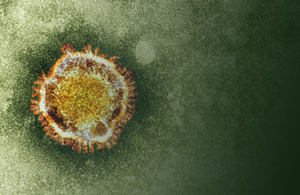Second case of MERS-CoV detected on flight through London
PHE advised of a case of MERS-CoV in a person flying from Jeddah to the USA and transiting through London on 1 May 2014.

Public Health England (PHE) was today (12 May 2014) advised of a case of Middle East Respiratory Syndrome (MERS-CoV) in a person flying from Jeddah to the USA and transiting through London on Thursday 1 May 2014.
The passenger was on Saudi Airlines flight 113 from Jeddah to London, and transferred at Heathrow for onward travel to the USA, where they were later confirmed positive for MERS-CoV.
This is the second incident involving a passenger transiting via Heathrow, following a case of MERS-CoV in the US from a passenger who travelled from Riyadh to Chicago and transited through London on Thursday 24 April 2014. Follow up with passengers on that flight found no cases of MERS-CoV.
Risk of transmission is considered extremely low but as a precautionary measure, PHE is working with the airline to be able to contact UK passengers who were sitting in the vicinity of the affected passenger to provide health information.
Any UK based passengers travellers on flight SV113 on 1 May who have since become unwell or experienced respiratory symptoms, such as shortness of breath, are advised to seek medical advice.
The period between exposure and when symptoms might develop (the incubation period) for MERS-CoV is currently considered to be up to 14 days. Any illness that passengers might experience more than 14 days after the flight (thus, starting on or after Wednesday 14 May), would not be considered to be related.
MERS-CoV is a new type of coronavirus, first identified in a Middle Eastern citizen in 2012. Although cases continue to be reported from the Middle East with an increase in reported cases in recent weeks, no new cases of MERS-CoV have been detected in the UK since the cases linked to the Middle East in February 2013.
Professor Nick Phin, Head of Respiratory Diseases for PHE said:
As with the incident earlier this month, the risk is very low. We will be following up with any UK passengers who were sitting in the vicinity of the passenger with MERS-CoV, as a precautionary measure.
Any UK based travellers who become unwell with a fever, cough or shortness of breath within 14 days of being in the Middle East, should make sure they call their doctor and tell them where they have travelled.
Although the source of MERS-CoV is currently unknown, there is growing evidence of the possible role of camels in transmitting MERS-CoV to humans. We advise travellers, particularly those with underlying or chronic medical conditions, to avoid contact with camels in the Middle East. All travellers should practice good hand and respiratory hygiene to reduce the risk of respiratory illness.
Notes to editors
- Middle East Respiratory Syndrome (MERS-CoV) was initially identified in a patient with severe respiratory symptoms in September 2012. Following its emergence, cases have continued to occur, primarily from within KSA and the UAE. However, cases have been imported to several European countries (France, Germany, Italy, UK, Greece) as well as other parts of the Middle East (Egypt, Jordan, Qatar, Kuwait and Oman) and the rest of the world (Malaysia, Philippines, Tunisia). For more information, visit PHE’s MERS-CoV webpages
- Public Health England’s mission is to protect and improve the nation’s health and to address inequalities through working with national and local government, the NHS, industry and the voluntary and community sector. PHE is an operationally autonomous executive agency of the Department of Health. www.gov.uk/phe Follow us on Twitter @PHE_uk
UKHSA press office: National Infection Service
UKHSA press office, infectious diseases
61 Colindale Avenue
London
NW9 5EQ